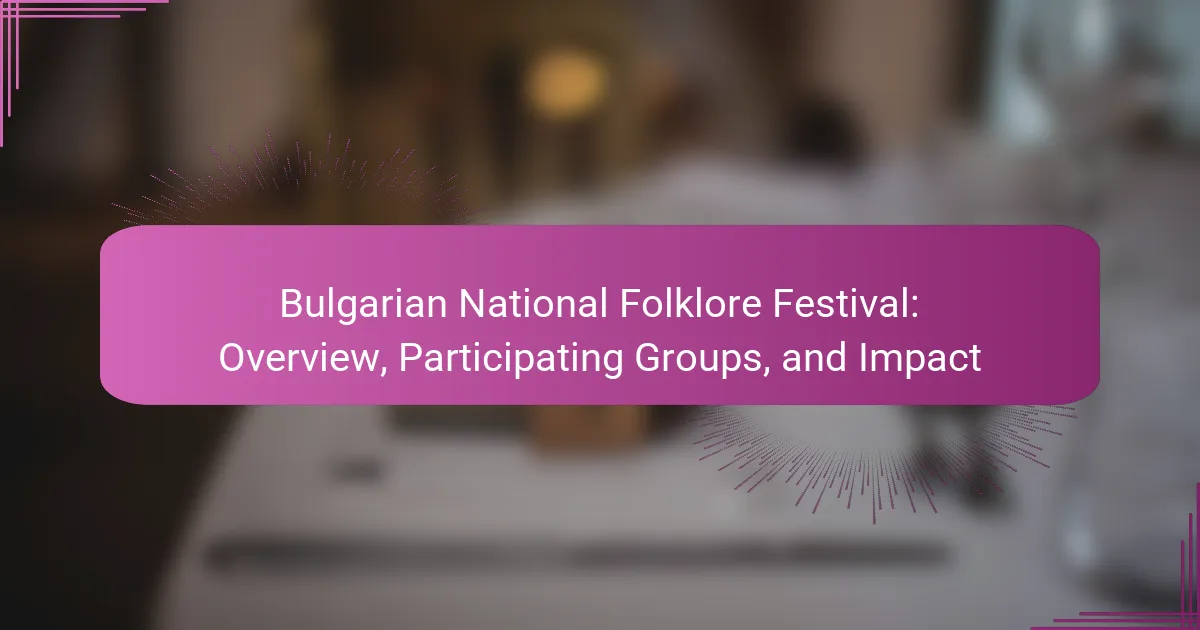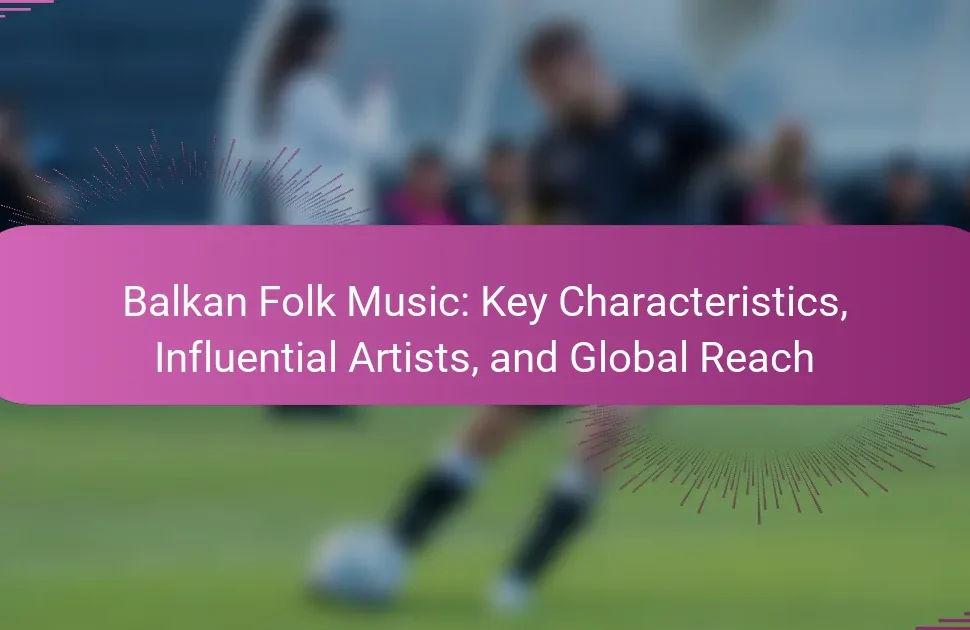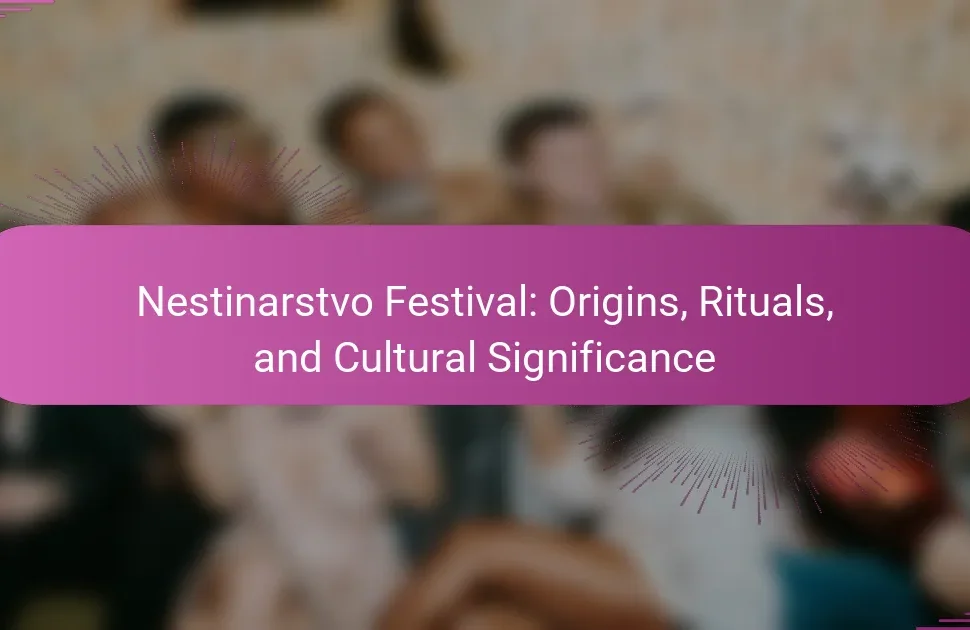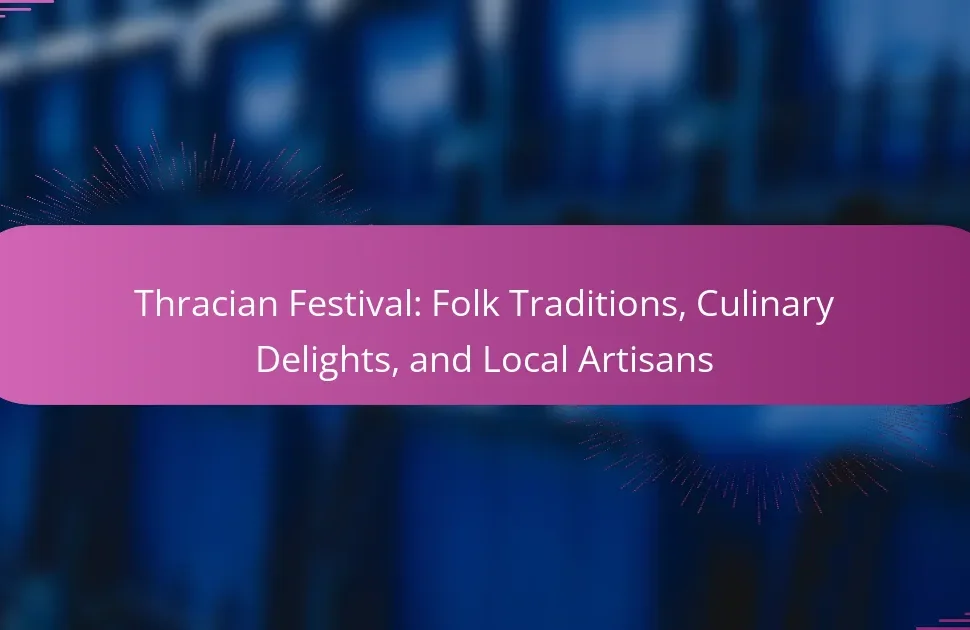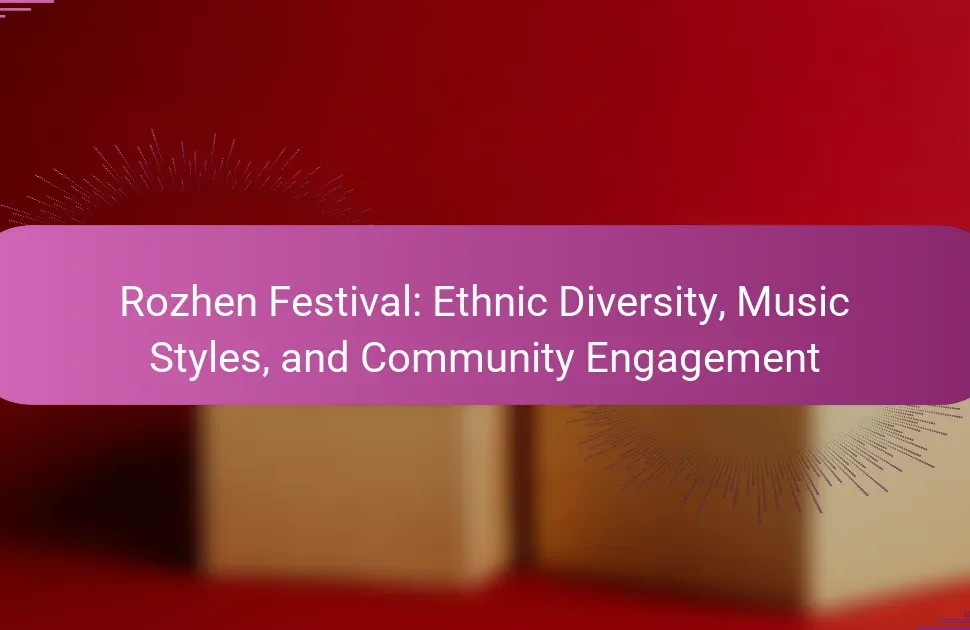The Bulgarian National Folklore Festival is a vital celebration of traditional music, dance, and crafts. This article explores the diverse participating groups, highlights the festival’s impact on community engagement and cultural preservation, and addresses the challenges it faces in maintaining authenticity and attracting younger audiences.
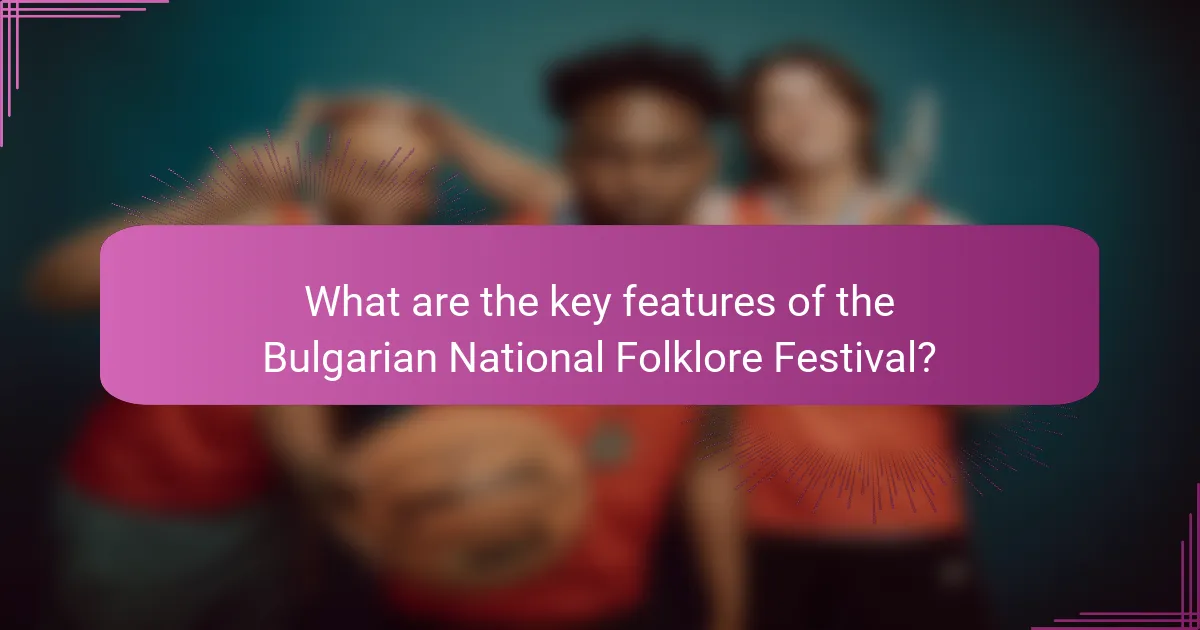
What are the key features of the Bulgarian National Folklore Festival?
The Bulgarian National Folklore Festival showcases traditional music, dance, and crafts. Key features include diverse participating groups, regional performances, and cultural workshops. The festival fosters community engagement and preserves Bulgarian heritage. It attracts thousands of visitors annually, enhancing cultural appreciation and tourism.
How does the festival celebrate Bulgarian culture and traditions?
The Bulgarian National Folklore Festival celebrates Bulgarian culture and traditions through vibrant performances, traditional costumes, and folk music. Participants showcase regional dances and crafts, highlighting the diversity of Bulgaria’s cultural heritage. The festival fosters community spirit and promotes the preservation of unique customs, ensuring that these traditions are passed down to future generations. Engaging workshops allow attendees to learn traditional crafts, further enriching their understanding of Bulgarian culture.
What are the main activities and performances at the festival?
The Bulgarian National Folklore Festival features traditional music, dance performances, and cultural exhibitions. Participating groups showcase regional folklore through vibrant costumes and authentic instruments. Workshops and interactive sessions engage attendees, promoting cultural exchange. The festival highlights Bulgaria’s rich heritage, fostering community spirit and appreciation for folklore.
Which regions of Bulgaria are prominently featured?
The Bulgarian National Folklore Festival prominently features regions such as Thrace, Rhodope, and Dobrudzha. Each region showcases its unique cultural heritage through traditional music, dance, and costumes. Thrace is known for its lively dances, Rhodope for its vocal traditions, and Dobrudzha for its folk songs. These regions contribute significantly to the festival’s diverse representation of Bulgarian folklore.
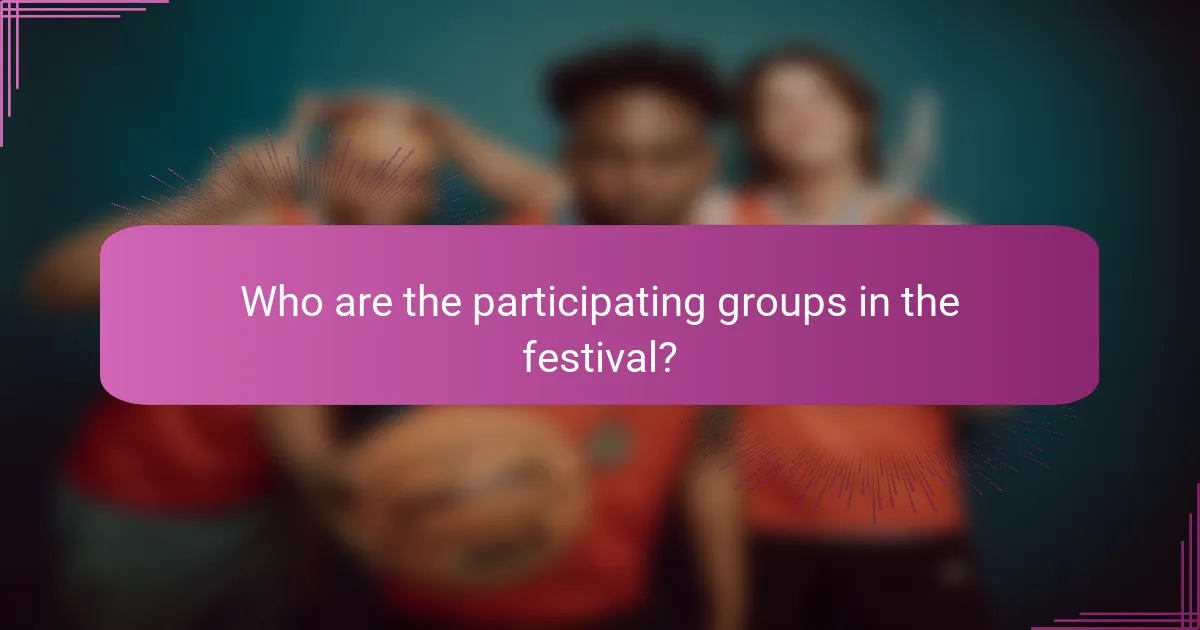
Who are the participating groups in the festival?
The Bulgarian National Folklore Festival features various participating groups, including regional folklore ensembles, dance troupes, and music bands. These groups represent diverse cultural traditions from different regions of Bulgaria, showcasing traditional costumes, music, and dance. Notable participants often include award-winning ensembles recognized for their authenticity and artistic excellence. The festival fosters cultural exchange and strengthens community bonds among the groups involved.
What types of performers participate in the festival?
The Bulgarian National Folklore Festival features a diverse array of performers, including traditional dancers, musicians, and vocalists. These artists represent various regional styles, showcasing Bulgaria’s rich cultural heritage. Performers often wear authentic costumes that reflect their local traditions. Additionally, the festival includes groups from both professional and amateur backgrounds, enhancing community involvement and cultural exchange.
How are local communities involved in the festival?
Local communities play a vital role in the Bulgarian National Folklore Festival by actively participating in its organization and events. They contribute through cultural performances, showcasing traditional music, dance, and crafts that highlight regional heritage. Local artisans often display their work, promoting craftsmanship and community pride. Additionally, community members assist in logistical arrangements, ensuring the festival runs smoothly and fosters a sense of belonging. This involvement strengthens cultural ties and enhances the festival’s impact on local identity.
Which organizations play a significant role in the festival’s organization?
The Bulgarian National Folklore Festival is organized by several key organizations. These include the Ministry of Culture, local cultural associations, and various folklore groups. Their collaboration ensures the festival showcases authentic Bulgarian traditions and promotes cultural heritage.
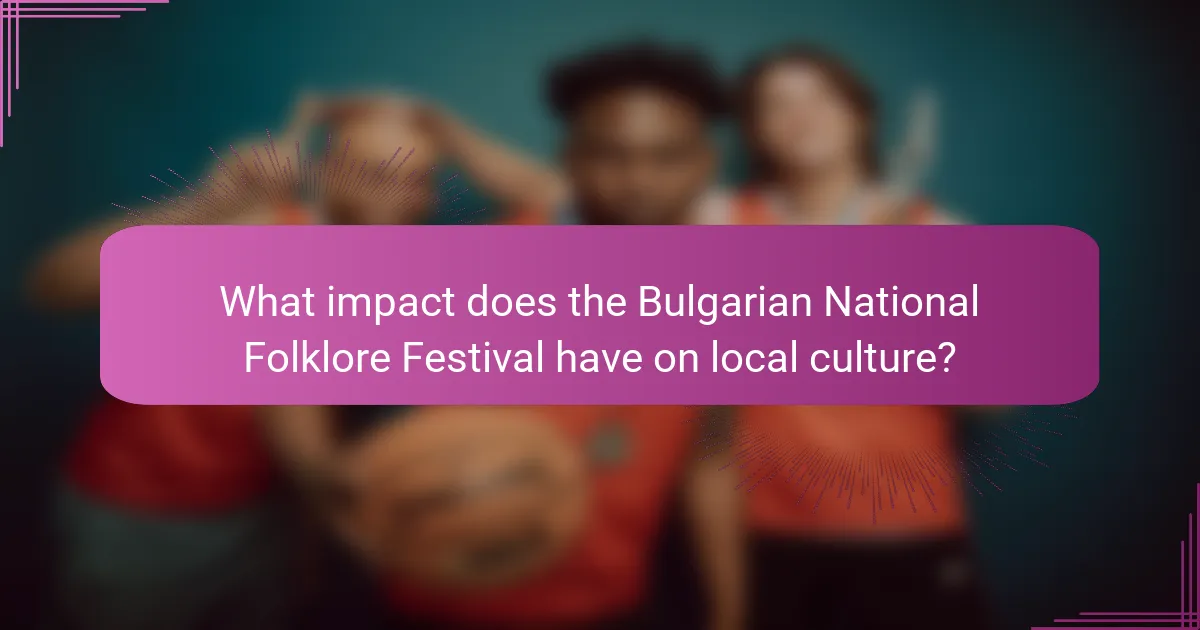
What impact does the Bulgarian National Folklore Festival have on local culture?
The Bulgarian National Folklore Festival significantly enriches local culture by promoting traditional music, dance, and crafts. It fosters community pride and encourages cultural exchange among participants and visitors. The festival showcases diverse folklore groups, enhancing appreciation for Bulgaria’s cultural heritage. As a result, it strengthens social bonds and revitalizes interest in local traditions.
How does the festival promote cultural preservation?
The Bulgarian National Folklore Festival promotes cultural preservation by showcasing traditional music, dance, and crafts. This event gathers diverse groups, fostering community engagement and intergenerational knowledge transfer. Participants share unique regional customs, ensuring these practices remain vibrant. As a result, the festival strengthens national identity and cultural heritage.
What economic benefits does the festival bring to local communities?
The Bulgarian National Folklore Festival brings significant economic benefits to local communities. It stimulates tourism, attracting thousands of visitors who spend on accommodation, food, and local crafts. This influx generates revenue for local businesses, creating jobs and enhancing community development. For instance, the festival can increase local sales by up to 30% during its duration. Additionally, it promotes cultural heritage, which can lead to long-term economic sustainability through continued interest in local traditions.
In what ways does the festival foster national identity?
The Bulgarian National Folklore Festival fosters national identity through cultural expression, community engagement, and preservation of traditions. It showcases folk music, dance, and crafts, reinforcing a shared heritage. Participating groups represent diverse regions, promoting unity and pride. The festival also educates younger generations on cultural values, ensuring continuity of national identity.
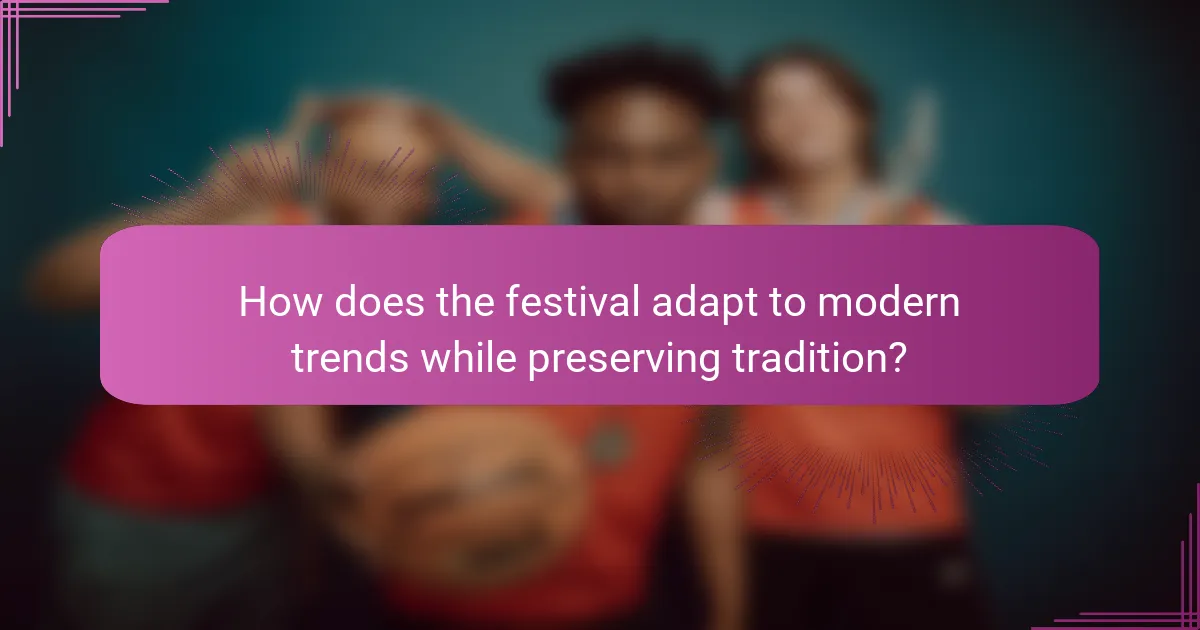
How does the festival adapt to modern trends while preserving tradition?
The Bulgarian National Folklore Festival adapts to modern trends by integrating contemporary performances while preserving traditional practices. It showcases traditional music and dance alongside innovative interpretations, attracting younger audiences. Participating groups often blend traditional costumes with modern aesthetics, creating a unique cultural experience. This fusion maintains cultural relevance and encourages community engagement, ensuring the festival’s longevity.
What innovative practices have been introduced in recent years?
Recent years have seen innovative practices in the Bulgarian National Folklore Festival, enhancing cultural representation and engagement. Notable changes include the integration of digital platforms for virtual participation, allowing international groups to join remotely. Additionally, workshops have been introduced, focusing on traditional crafts and dance, fostering skill development among attendees. The festival has also emphasized sustainability, promoting eco-friendly practices in event organization. These innovations have broadened the festival’s reach and strengthened community ties.
How do digital platforms enhance the festival experience?
Digital platforms significantly enhance the festival experience by facilitating engagement, information sharing, and accessibility. They allow attendees to connect with performers and each other, share real-time updates, and access schedules and maps. Additionally, platforms can amplify the festival’s reach, attracting more participants and showcasing diverse groups. This digital integration fosters a vibrant community around the Bulgarian National Folklore Festival, enriching cultural exchange and participation.
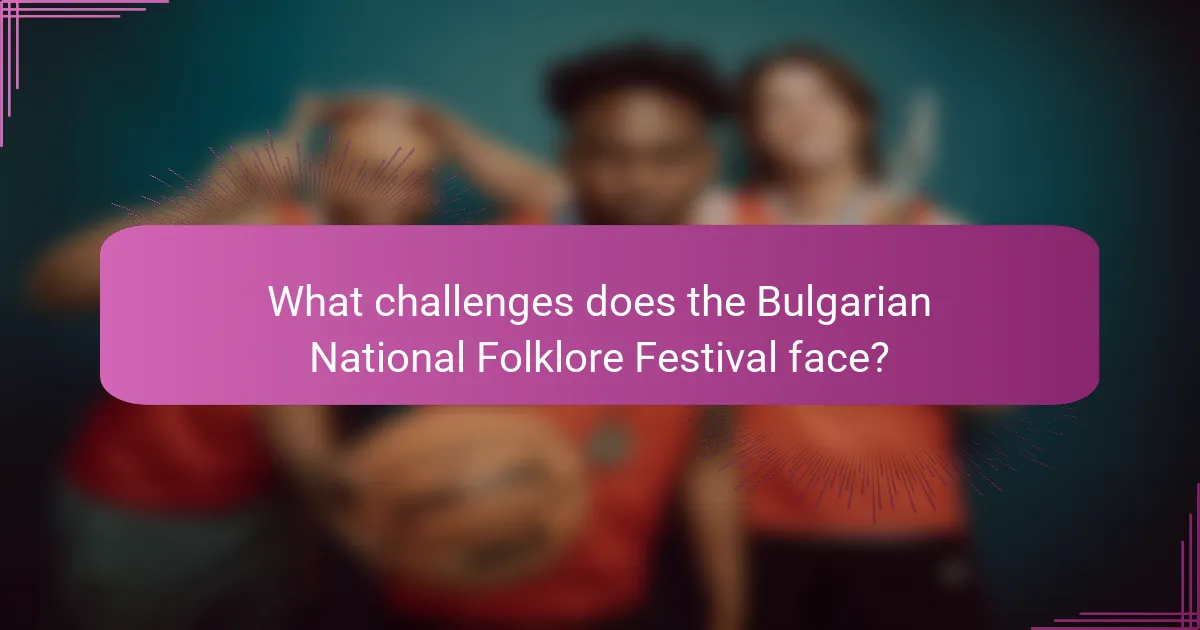
What challenges does the Bulgarian National Folklore Festival face?
The Bulgarian National Folklore Festival faces challenges such as funding limitations, participant engagement, and preserving cultural authenticity. These issues hinder the festival’s growth and impact on promoting Bulgarian heritage. Limited financial resources restrict the ability to attract diverse groups and enhance event quality. Engaging younger generations proves difficult, as they may prefer modern entertainment over traditional folklore. Additionally, maintaining the authenticity of performances while encouraging innovation poses a unique challenge for organizers.
How does the festival address issues of sustainability?
The Bulgarian National Folklore Festival promotes sustainability through eco-friendly practices and community involvement. The festival emphasizes the use of local materials, reducing waste, and supporting sustainable tourism. Participating groups showcase traditional crafts, encouraging the preservation of cultural heritage while fostering environmental awareness. Additionally, the festival engages attendees in workshops that highlight sustainable practices, further reinforcing its commitment to sustainability.
What are the common misconceptions about the festival?
Many misconceptions exist about the Bulgarian National Folklore Festival. One common belief is that it only showcases traditional music, while it also highlights dance, crafts, and regional customs. Another misconception is that the festival is solely for locals; in reality, it attracts international participants and audiences, enhancing cultural exchange. Some people think the festival is a recent event, but it has deep historical roots, celebrating Bulgarian heritage for decades. Lastly, there is a notion that the festival is merely a tourist attraction; however, it serves as a vital platform for preserving and promoting folklore among younger generations.
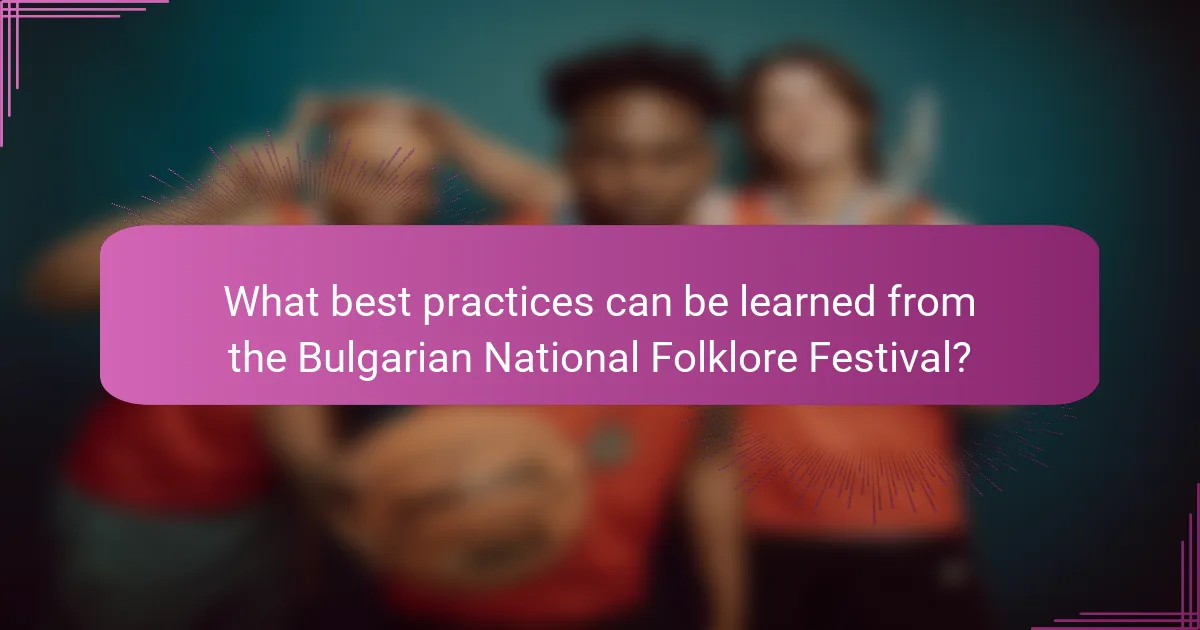
What best practices can be learned from the Bulgarian National Folklore Festival?
The Bulgarian National Folklore Festival offers valuable best practices for cultural preservation and community engagement. Emphasizing authenticity, the festival showcases traditional music and dance, fostering a sense of identity. Collaboration among diverse groups enhances participation and strengthens community ties. Engaging younger generations through workshops ensures the continuity of folklore traditions. Additionally, utilizing social media for promotion broadens outreach and attracts international interest. These practices can serve as a model for similar cultural initiatives worldwide.
How can other cultural festivals benefit from the festival’s model?
Other cultural festivals can adopt the Bulgarian National Folklore Festival model to enhance community engagement and cultural preservation. This festival showcases diverse folklore, encouraging participation from various groups. By implementing similar structures, festivals can increase attendance and foster cultural exchange. Collaborations with local artisans and performers can enrich experiences, promoting local heritage. Festivals can also integrate educational programs, providing insights into traditions and practices. These strategies can create a vibrant atmosphere that attracts visitors and sustains cultural identities.
What tips can participants follow to maximize their experience at the festival?
To maximize their experience at the Bulgarian National Folklore Festival, participants should engage actively and immerse themselves in the cultural offerings. Arrive early to explore various performances and workshops. Interact with local artists to gain insights into their crafts. Attend diverse events to appreciate the festival’s full spectrum. Participate in dance and music sessions for hands-on experience. Lastly, savor traditional foods to enhance cultural appreciation.
